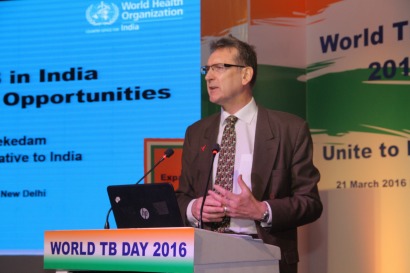Calling for accelerated efforts to combating TB in the country, the Union Minister for Health & Family Welfare, Mr J.P. Nadda launched a wide range of new tools and guidelines at an international consultation on Fast tracking access to quality diagnosis and treatment.
Held on 21 March 2016, the consultation commemorated the World TB Day, which is observed on 24 March every year.

Speaking on the occasion Mr Nadda said that resources will not be a constraint and the government will continue to work with all stakeholders, in devising short term and long term approaches.
Addressing the meeting, Dr Poonam Khetrapal Singh, Regional Director, WHO South-East Asia Region said, “The mission-like zeal with which polio and HIV/AIDS have been fought must be reproduced in the battle against TB, and must lead to organizational and programming shifts. TB programs must be given a special place within the health sector and empowered to act via operational structures that foster rapid, efficient and autonomous decision-making.”
The Minister launched the WHO’s Strategic Plan 2016-2020 for TB that seeks to fast track strategy focusing on the needs of the high burden countries and high risk population, and for a Region free of TB with zero death, disease and suffering due to the disease.
Mr Nadda also inducted 500 Cartridge Based Nucleic Acid Amplification Test (CBNAAT) machines in the programme. The CBNAAT is a revolutionary rapid molecular test, which detects Mycobacterium tuberculosis and rifampicin drug resistance, simultaneously. This test is fully automated and provides results within two hours.
The Minister launched on the occasion:
- Bedaquiline, the new anti-TB drug for Drug Resistant TB under the conditional access program. The drug is first anti-TB drug discovered in nearly 40 years.
- Third line ART programme for People Living with HIV; the life-saving third line ART costs nearly Rs. 1.18 lakh per patient per year. Provided free, it will not only safe lives but also improve socioeconomic conditions of the patients.
Mr Nadda also released important guidelines and reports at the consultation:
- TB India 2016 Annual Report
- Technical and Operational Guidelines for TB Control in India 2016 (TOG). The new strategies and tools in the ToG follow the Standards for Care in India and is an important step towards achieving the WHO’s End TB Strategy targets.
- A handbook for ‘Healthcare Worker surveillance for TB in India’
- Guidelines for Prevention and Management of Adverse reactions associated with anti-TB drugs
- Guidelines for use of Bedaquiline in RNTCP
A new radio campaign with TB ambassador Amitabh Bachchan and social media campaign was also launched at the event.
Co-chairing a technical session on TB Care and Prevention – urgency to move forward with newer approaches to End TB, Dr Henk Bekedam, WHO Representative to India, made a presentation on Challenges and opportunities for Ending TB in India.
He highlighted the need to leverage the new opportunities for better diagnosis and treatment for TB e.g. the Revised Operational Technical Guidelines. He urged the need to fully engage the private sector and also a country level scale-up, which would involve more resources.
“Partnership is the key to ending the TB epidemic,” he added.
The meeting organised by the Ministry of Health & Family Welfare (MoHFW), Government of India, and World Health Organization South-East Asia Region, with the support of WHO Country Office for India, was attended by TB programme managers and health department officials of all states and countries in WHO South-East Asia Region. Also present on the occasion were senior officials of MoHFW, Stop TB partnership, USAID and the Global Fund.
